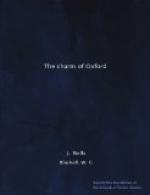The origin of this hall is an unsolved problem: it derives its name according to one theory from Edmund Rich, the last Archbishop of Canterbury to be canonized, and probably the first recorded Doctor of Divinity at Oxford. But this theory is very doubtful, and Hearne, most famous of Oxford antiquarians, and probably the best known member of St. Edmund Hall, did not believe it. In any case, most of the buildings of the hall date long after St. Edmund, and belong to the middle of the seventeenth century. Hearne himself is sufficient to give interest to any foundation. He was a great scholar and a careful editor of the early English Chroniclers in days when learning was decaying in Oxford; even now his work as an editor is not altogether superseded. But it is not to this that he owes his fame; it is rather to the fact that he has high rank among the diarists of England, and the first place among those of Oxford. For thirty years (1705-1735) in which latter year he died, he poured into his diary everything that interested him—scholarly notes, political rumours, personal scandal, remarks on manners and customs. The 150 volumes came into the possession of his fellow Jacobite, Richard Rawlinson, the greatest of the benefactors of the Bodleian, and only now are they being fully edited; ten volumes have been issued by the Oxford Historical Society, and still there are a few more years of his life to cover. As a specimen of Hearne’s style may be quoted his remarks, when the sermon on Christmas Day, 1732, was postponed till 11 a.m.
“The true reason is that people might lie in bed the longer. . . . The same reason hath made them, in almost all places in the University, alter the times of prayer, and the hour of dinner (which used to be 11 o’clock) in almost every place (Christ Church must be excepted); which ancient discipline and learning and piety strangely decay.” Hearne was critical rather of past history than of present-day rumour; he records complacently (in 1706) that at Whitchurch, when the dissenters had prepared a great quantity of bricks “to erect a capacious conventicle, a destroying angel came by night and spoyled them all, and confounded their Babel.” Hearne would by no means have approved of the Methodist principles of six members of his hall in the next generation, who were expelled for their religious views (1768). A furious controversy, with many pamphlets, raged over them, and the Public Orator of the University wrote a bulky indictment of them, which was answered by another pamphlet with the picturesque title of “Goliath Slain.” Pamphleteers were more free in their language in those days than they are now.
The hall has always been a strong religious centre, and plays a very useful part in the University—by giving to poor men, seeking Holy Orders, a real Oxford education, based on the true Oxford principle of community of life.




